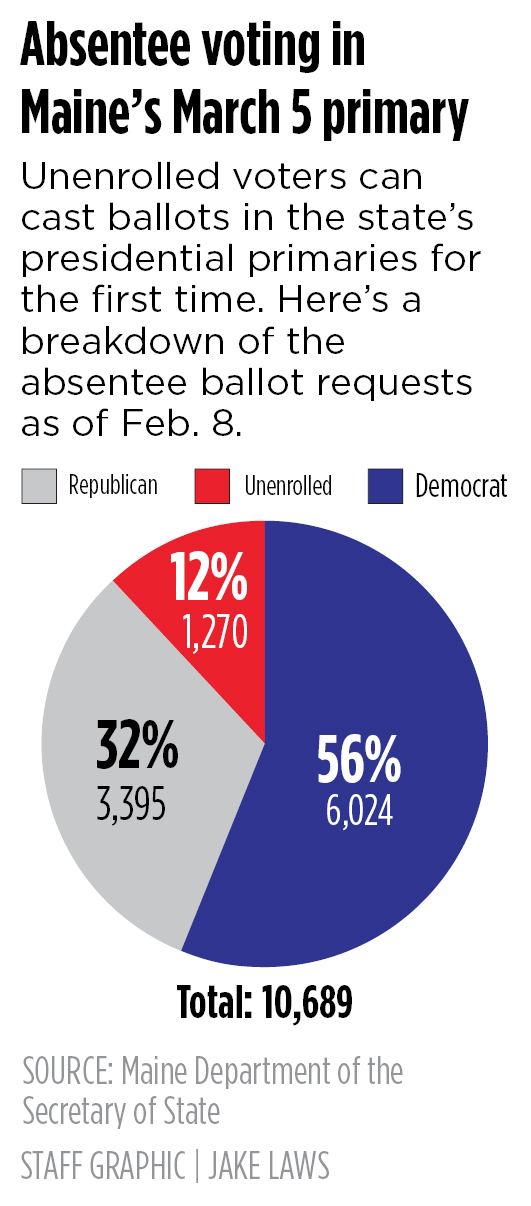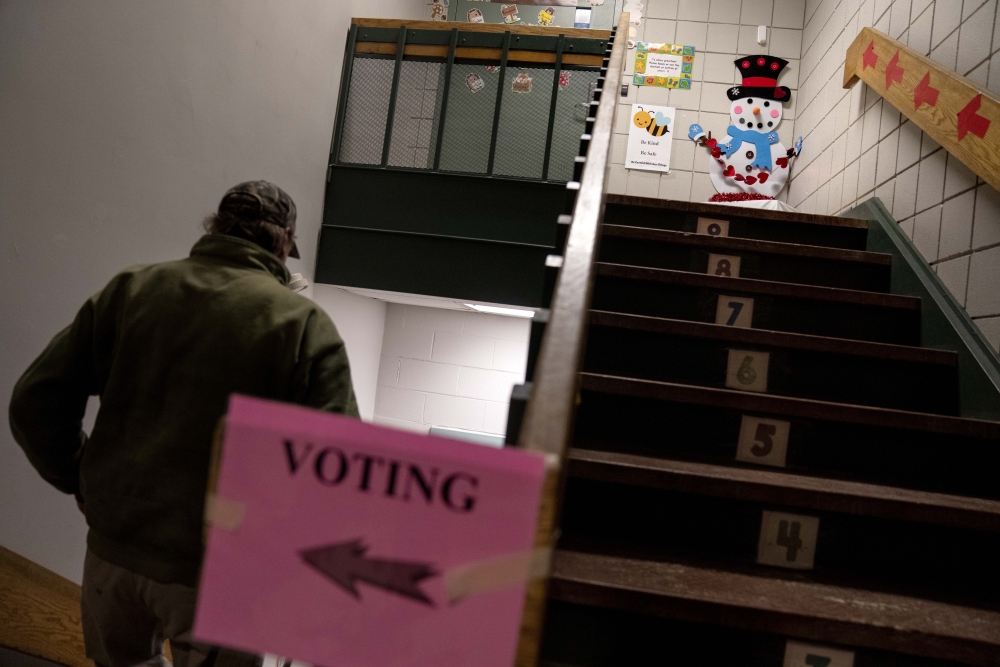With Maine’s first election under a new semi-open primary law less than one month away, some unenrolled voters are already preparing to take advantage and cast ballots for either a Republican or Democratic presidential nominee.
More than 1,200 unenrolled voters requested absentee ballots for one of the March 5 primaries as of Thursday, less than one week after they became available, the Department of the Secretary of State said.

But city and town clerks said the number of voters who have come in to municipal offices to unenroll from a party ahead of the primaries, or switch their party affiliation, are so far not significantly larger than previous years.
Kennebunk Town Clerk Merton Brown said he has seen some changes in enrollments, but nothing unusual. “We’ve had some people – maybe 15 or 20 – who have gone from Republican or Democrat to unenrolled to have the flexibility in the open primary to choose the Republican or Democrat ballot,” Brown said.
Maine used to have a closed party nomination process, which meant unenrolled or independent voters could not participate. The 2024 primaries are the first to be held under a new semi-open primary law that allows unenrolled voters to vote in either party primary. Unlike in a fully open primary, however, voters enrolled in a party can only vote in their party’s primary.
Maine Voters who are enrolled in a political party must switch to a different party this week in time to vote in the new party’s primary March 5, while unenrolled voters will be able to participate without registering for a party ahead of time.
Maine’s new semi-open primary system comes as some national organizations opposing former President Donald Trump have encouraged Democrats and unenrolled voters to cast ballots in the Republican primaries for a different Republican nominee. Trump criticized the efforts in New Hampshire, but easily won the state’s primary anyway.
At least one national group, PrimaryPivot, has been urging voters to change their party affiliation, if necessary, to vote against Trump in the Republican primaries.
It’s not clear how many of the unenrolled voters seeking absentee ballots are planning to vote in the Republican primary versus the Democratic primary. The secretary of state’s office said that data won’t be available until after the election.
As of Jan. 18, Maine had 948,734 registered active voters, of which 36% were Democrats, 30% were Republicans, 29% unenrolled and 4% were Green Independent voters. The rest were affiliated with the No Labels and Libertarian parties, according to the most recent statewide data.
Nearly 10,700 absentee ballots had been requested as of Friday for the March 5 primaries, with Democrats requesting 56% of the ballots, Republicans 32% and unenrolled voters 12%.
While there doesn’t appear to be significant shift in voter enrollments in Maine so far, some voters have been open about the strategy.
Henry Garfield, a Bangor voter who recently switched his enrollment from Democrat to Republican, said he decided to make the change in hopes that a vote against Trump in the Republican primary might help stop him from getting the party’s nomination and being reelected.
“I’m pessimistic (my vote) can influence the outcome of the Republican nominating process,” he said. “I would like to think it could, but I’m pessimistic.”
Still he felt like he had to do something.
“I think a lot of us feel powerless,” said the 66-year-old author and English professor at the University of Maine. “We’re just appalled he’s still a viable candidate for president. So I guess my thought was what can I do as one person?”
Garfield, who also wrote about his decision to switch parties in an opinion column for the Portland Press Herald, said he considered switching to unenrolled but felt strongly about choosing a party before voting for its nominee.
The number of voters who switch parties or unenroll is likely to be small this election cycle, though there may be some uptick compared to a normal year, said Mark Brewer, professor and chair of the political science department at the University of Maine.
“I don’t think there’s going to be a wave of it, but there may be more of this kind of stuff because we do have the semi-open primary and you’ve got a candidate on one side who generates a lot of passion both for and against,” Brewer said.
“If you’re a Democrat and you think Donald Trump is an existential threat and you want to do all you can to make sure he doesn’t show up on ballot, (you might be thinking) is it worth it to unenroll and go vote in the Republican primary to vote against Trump?” But, he said, “I don’t think it will be a huge number.”
Election clerks say they are not seeing evidence of major shifts.
LITTLE CHANGE IN PORTLAND
In Portland, City Clerk Ashley Rand said the city “hasn’t seen too many party changes in the last couple of months,” and that requests for absentee ballots have in general been slow.
As of Friday, the majority-Democrat city had received 688 absentee ballot requests, including 502 from Democrats, 139 from Republicans and 61 from unenrolled voters. Rand said the city’s data report does not break down which ballot the unenrolled voters are choosing.
In Lewiston, City Clerk and Registrar of Voters Kathy Montejo said they have not had any large increases in voter registrations or party enrollment lately, but the city also had two large municipal elections last fall where people most likely would have registered for the first time or made changes at the polls.
“We have not seen a lot of voters coming into the office lately to change parties or withdraw,” Montejo said in an email.
Maine’s new semi-open primary makes it one of seven states that allow voters who are unaffiliated with any party to participate in any party primary they choose, according to the National Conference of State Legislatures.
Sixteen states have fully open primaries in which voters can participate in any primary election they choose, regardless of party affiliation, while most other states have closed primaries, where only party voters can participate, or have other forms of restrictions on who is allowed to participate and if they must register with the party.
Under Maine’s law, voters who want to switch from one party to another have must do so at least 15 days before the primary. For the March 5 election, that date is Feb. 19.
However, since Feb. 19 is a holiday and most municipal offices are closed on the weekend, and many on Fridays, the last day most voters can change from one party to another and still participate in the primaries will be Thursday or Friday, depending on the municipality.
« Previous
Related Stories































Invalid username/password.
Please check your email to confirm and complete your registration.
Use the form below to reset your password. When you’ve submitted your account email, we will send an email with a reset code.